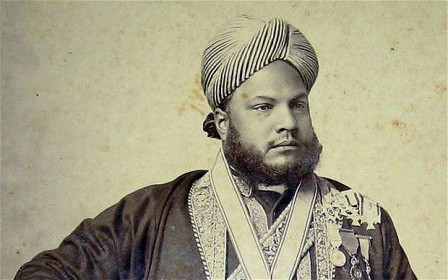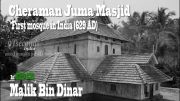‘I am so very fond of him. He is so good and gentle and understanding… and is a real comfort to me.”
These were the words of Queen Victoria speaking to her daughter-in-law, Louise, Duchess of Connaught, on November 3, 1888, at Balmoral. Perhaps surprising, though, is who she was talking about – not her beloved husband, Albert, who had died in 1861. Nor John Brown, her loyal Scottish ghillie, who in many ways filled the void left by Albert, since Brown had died in 1883.
Instead, Queen Victoria was referring to Abdul Karim, her 24-year-old Indian servant.
Her relationship with Karim was one that sent shockwaves through the royal court – and ended up being one of the most scandalous periods of her 64-year reign.
Indeed, such was the ill-feeling that when Victoria died, her son King Edward ordered all records of their relationship, including correspondence and photographs, to be destroyed.
But a new archive of letters, pictures and Karim’s “lost diary”, held secretly by his family for more than a century, sheds new light on their relationship.
The documents tell the story of how Karim arrived in England in 1887 and quickly gained the affection of a monarch 42 years his senior. They chart the remarkable rise of the clerk from Agra in northern India to one of Victoria’s closest and most influential friends.
The author Shrabani Basu discovered the documents after writing Victoria & Abdul, her book on the remarkable relationship between the Queen and her Indian servant. In 2010 Basu was in Bangalore, India, for the book’s launch when she received a call from the British Council. Begum Qamar Jehan, then 85, frail and blind, was one of Abdul Karim’s few remaining relatives (Karim had had no children himself); yet, despite her age and condition, she still had vivid memories of her days in Karim Lodge, Agra (more of which later). Moreover, she had in her possession Karim’s diary documenting the period in which he served Queen Victoria.
Two months later Basu flew from London to Karachi in Pakistan. She was handed the diary – a neat brown journal with gold edges, recognisable as the stationery used in Windsor. It contained a record of Karim’s 10 years in London between the Golden and Diamond jubilees. The pages were also filled with photographs and magazine cuttings. It had been smuggled out of India by the family when they had fled in 1947 following the Partition riots, then kept a closely guarded secret until Basu’s visit. Basu has now updated her remarkable story of the Queen and her Indian manservant with extracts from his diary – plus from Queen Victoria’s Hindustani Journals, which Basu has had translated for the first time.
Karim initially moved to England for Queen Victoria’s Golden Jubilee – the Queen wanted two Indian waiters there to attend to the Indian princes who would be present. Victoria was instantly charmed by the tall, elegant Karim, and within a year he had transcended from waiting tables to becoming a powerful figure within the royal court.
Yet in the opening paragraphs of his diary, Karim remarks on the humble nature of his status in the Royal household: “Under the shadow of Her Majesty, Queen Victoria, I a humble subject venture in the following pages to lay before the reader a brief summary from the journal of my life at the court of Queen Victoria from the Golden Jubilee of 1887 to the Diamond Jubilee of 1897. As I have been but a sojourner in a strange land and among a strange people I humbly trust all mistakes will be kindly overlooked by the reader who would extend indulgence to the writer of these pages.”
He then goes on to describe his initial thoughts on coming to England: “In 1887 with the recommendation of Dr Tyler who was my superior officer at the Central Jail [where he was working as a clerk] I came to England as orderly to the Queen. I must mention that the word ‘orderly’ as understood by us in India means one who has to accompany a sovereign or Prince or other high person of rank on horseback. It is a much higher position than the orderly of the British Army who is simply a private soldier selected to attend an officer as a personal servant carrying his orders etc. It was in the former sense of the word that I accepted the proposal to go to England.”
On arriving in London, he notes, he visits the zoo as well as Madame Tussauds. Yet sightseeing was not Karim’s prime purpose; he is there to meet the Queen. He recounts their first audience:
“Dr Tyler and I were instructed to take our station near the dining room and wait her Majesty’s coming. I was somewhat nervous at the approach of the Great Empress who soon entered accompanied by HRH the Duke of Connaught and Princess Beatrice. Dr Tyler at once did homage by kneeling, whilst I did the same in Oriental style. I presented nazars, or gifts by exposing, in the palms of my hands, a gold mohar [a coin] which Her Majesty touched and remitted as is the Indian custom. The Queen was thereafter pleased to speak to Dr Tyler a few words, and so ended my first interview with the Empress of India.”
Two days later, Dr Tyler received a telegram asking him to return to Buckingham Palace with Karim. The queen wrote in her diaries about her two new Indian servants: “The one Mohammed Buksh, very dark with a very smiling expression… and the other, much younger, called Abdul Karim, is much lighter, tall and with a fine, serious countenance. His father is a native doctor at Agra. They both kissed my feet.”
Karim introduced curry to the royal menu and started teaching her to speak Urdu, offering lessons every evening. As Empress of India – and a committed Indophile – nothing pleased her more.
Yet Karim was dispirited – he was unhappy doing such a menial task as waiting tables and professed his wish to return to his homeland. This is mentioned in his diaries.
The following letter from Queen Victoria that Karim kept in his journal asking him to stay is significant: that letter was one of many destroyed by her son, King Edward, following his mother’s death. Karim, however, had kept a certified copy:
“General Dennehy has read me your petition… I shall be very sorry to part with you for I like and respect you, but I hope you will remain till the end of this year or the beginning of the next that I may be able to learn enough Hindustani from you to speak a little. I shall gladly recommend you for a post in India which could be suitable for you and hope that you may be able to come and see me from time to time in England.”
And recommend him for a post she did: Queen Victoria made Abdul Karim her official munshi (teacher) as well as Indian Clerk to the Queen. This too he notes in his diary: “It was a day I shall never forget and for the same I shall ever thank my God and pray for the long life and happiness of Her Majesty.”
Henceforth Karim travelled everywhere with the Queen, even on her tours of Europe, meeting numerous monarchs and prime ministers along the way. The Queen allowed him to move his wife over to England, and the couple were given their own cottage on each of her estates. In Balmoral, a special cottage was built just for him, and the Queen called it “Karim Cottage” in his honour. The munshi spared no expense decorating and, on the completion of Karim Cottage, threw a house-warming party for the ladies and gentleman of the household.
According to his diaries, Karim seems particularly enamoured by Balmoral: “I admired the scenery for it reminded me so forcibly of the Highland scenery of India which is much resorted to by Europeans during the hot season… I was told that Her Majesty is particularly partial to this residence in the Highlands. During the summer the neighbouring hills are covered with the rich bloom of the white and purple heather and with many kinds of wild flowers. To add to the charms of the scenery the silver Dee flows directly past the back of the castle.”
He isn’t as impressed with Glasgow, though: “Glasgow is a very dirty town but it could not be otherwise as it is purely a business centre. There are numerous manufactories, ship building yards and great iron works. The country round about produces abundance of coal. It is situated on the River Clyde, the water of which is so black and dirty… that no fish can live in the river.”
On one of his many foreign trips with the Queen, this time to Nice, he remarks upon his good fortune: “Events which we never thought or even dreamt of happening to us cause us to wonder at the wonderful ways God makes use of in working out his purposes. This thought came to my mind as I considered the wonderful good fortune that happened to some Indian jugglers who chanced to be in Nice while Her Majesty was there. When Her Majesty came to hear of them she sent a request to have them brought before her to exhibit their tricks. The Queen was highly amused and delighted and the honour which was given to these poor jugglers must have made them happy for life.”
Still, many in the royal court were unhappy with Karim’s constant presence. He was forever by her side and the Queen, a prolific letter-writer, often sent him several letters a day. He became her most trusted companion. Although mother to nine children, her relationship with them was distant – and often strained. She missed her late husband dearly, and was desperate for company. As the years went on, Karim’s influence grew, and in time, the one-time servant had servants himself.
The courtiers’ fears had some substance. Since Karim saw every letter that the Queen sent, he was soon advising her on how to deal with sectarian problems between Muslims and Hindus – advice she passed on to the bemused Viceroy. Unsurprisingly, her solutions always seemed to favour the Muslims – Karim, of course, was a Muslim. He even asked to be given a knighthood – one of the few requests the Queen turned down.
The courtiers’ resentment came to a head in 1889 when the Queen spent the night with her munshi at Glassalt Shiel, the isolated Scottish cottage she had once shared with John Brown but vowed never again to visit after he died. Although it appears to have been platonic, he was 26 and she 70, so eyebrows would have been raised. Several courtiers – and indeed members of the Queen’s own family – attempted to distance the Queen from Karim but to no avail; indeed, she thought their actions were motivated by race – and jealousy.
Karim only notes the hostility towards him in his diaries once, and in passing: “The memorable year [Diamond Jubilee year] did not open well… The unpleasantness I remarked on last year still existed.”
Queen Victoria died in 1901, and Abdul Karim was given a prominent place in the funeral possession. Yet days later, guards ordered him to hand over every letter she had written to him. He must somehow have managed to keep his diary concealed.
The few other documents that survived fire are held at Windsor. These include a journal kept by the Queen that was written entirely in Hindustani, and Shrabani Basu has painstakingly translated all 13 volumes.
The translations also reveal fascinating insights into the nature of the Queen’s relationship with Karim.
Abdul had created a phrase book of everyday Urdu words for the Queen to use when speaking to her Indian servants, as well as visiting royalty, and has written them out in Roman script.
The phrases include the standard ones such as: “You may go home if you like” (Tum ghar jao agar chhate ho); and: “The egg is not boiled enough”.
But some of the phrases are significantly more intriguing. For instance: “You will miss the munshi very much” (Tum munshi ko bahut yad karoge). And: “Hold me tight” (Ham ko mazbut thamo).
The Windsor documents also contain letters from Queen Victoria to Karim, frequently concerning his wife (towards whom, it would appear, she was equally fond), signed: “dearest mother”; or “Your loving mother, Victoria R.I.”
She nearly always signed these in Urdu. Moreover, the intimate details that the Queen included showed how close she had come to Karim. For instance, the Queen learnt that Karim and his wife had been unsuccessfully trying to have children, and decided to get medical advice:
“I spoke to Dr Reid about your dear wife and I think he will understand easily what you have to tell him. It may be that in hurting her foot and leg she may have twisted (moved or hurt) something in her inside, which would account for things not being regular and as they ought.”
Following the letter-burning, Karim and his wife were ordered to return to India. Years of fine living in the Queen’s palaces meant Karim had grown portly. He had also grown rich, and, returning to Agra, built himself a house, Karim Lodge. He died eight years after his return, at the age of 46.
Yet King Edward’s paranoia was not quelled, and he sent more agents to India to demand that all memorabilia relating to the Queen be burned, much to the alarm of Karim’s grieving widow. King Edward had done the same with all mementos of his mother’s relationship with John Brown.
After all these years, Abdul Karim’s family decided to come forward with the diary as they were determined to show him in a more positive light; not the social climber he had been painted as by many. In truth, Karim was one of the Queen’s closest companions, and offered the widowed monarch a great deal of support – and pleasure – during her lonely later years.
Extracted from ‘Victoria & Abdul’ by Shrabani Basu, published by The History Press March 7. Published in the Telegraph 28 February 2011





Be the first to comment on "The lost diary of Queen Victoria’s final companion – Abdul Karim"